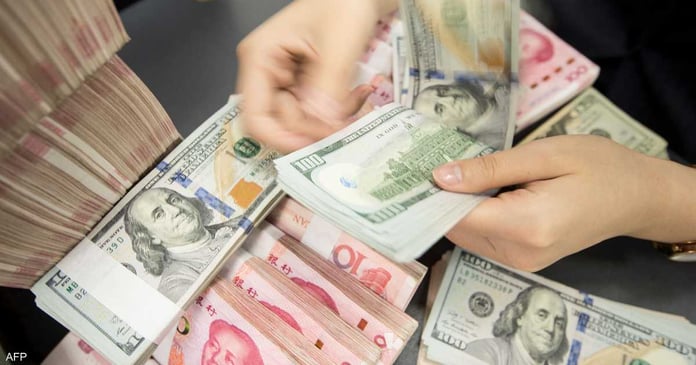For more than a decade, Beijing has been keen to reduce its dependence on the US dollar. Driven by the desire to increase his influence and the risks stemming from the US economy, such as the global financial crisis that shook the world in 2008.
And with the recent rise in tensions between the United States and China, against the backdrop of the Taiwanese crisis, China has accelerated its steps to isolate its economy from the global economic system by strengthening the local currency. To avoid the trap of Western sanctions, in the event of a war with neighboring Taiwan.
Ukrainian War
A report by the English newspaper “The Guardian” states: “The war in Ukraine has already hurt the Russian economy, after Moscow interrupted trade transactions, which depend on the US dollar, which undermined the movement of the economy. Russian and limited its ability to communicate with other countries.
At the same time, there was a winner – unwittingly – behind the Western sanctions package, soaring high with unexpected victories.
Last year, the share of Russian imports paid for in yuan increased from 4% to 23% in February, and for the first time in the history of the Moscow Stock Exchange, the yuan overtook the dollar as the currency the no longer traded.
In an interview with “Sky News Arabia Economy”, Matthias Hafner, a researcher at the “Swiss Economics” Center for Economic Research in Switzerland, said that it is possible that the internationalization of the yuan is not directly linked to the war in Ukraine. However, Western sanctions against Russia have led to closer economic relations between China and Russia, which has increased the use of the yuan in bilateral trade between the two countries.
It should be noted that China Customs data, released recently, showed that Chinese exports to Russia jumped 153.1% in April to $9.6 billion, continuing their rapid upward trajectory from March. , when exports rose 136.4% after growing 19.8% in the first two months of the year. .
According to ‘The Guardian’ report, and based on data from the SWIFT platform, China began strengthening the yuan before the outbreak of the Ukrainian war, with Beijing’s share of global trade finance doubling between March 2021 and March 2023, to reach 4.5%. , and entered into fierce competition with the euro, whose share is estimated at 6%.
Matthias adds: “The rise of the yuan could lead to a reduction in the dominance of the US dollar in international trade and finance. Nevertheless, the US dollar remains the most widely used currency in the world and is expected to remain so for the future. foreseeable future.”
According to SWIFT data, the yuan still accounts for a small share of global trade volume (4.5%), compared to the dollar, whose share fell to 84.3% in February 2023, from 86.8. % the previous year.
safety rope
Apart from the Russian-Ukrainian war, efforts to strengthen the position of the yuan were also linked to recent measures taken by the Chinese government, the most important of which is to encourage countries to adopt the yuan in international transactions, as well as than a number of other measures, such as:
Argentina and Brazil eventually reached agreements to pay for Chinese imports in yuan instead of US dollars. In March, a Chinese company used the yuan to purchase 65,000 tonnes of liquefied natural gas (LNG) from French multinational Total Energies, the first time the Chinese currency had been used in an international LNG deal. Bangladesh announced in April that it had agreed to pay $318 million in yuan; To settle part of a Russian loan used to finance the development of a nuclear power plant. China has also developed an alternative to SWIFT, as well as a digital currency, e-CNY.
For his part, Matthias Hafner believes that China’s objective behind increasing its dependence on its currency is to expand its global circles of influence and reduce its dependence on the dollar. US as the dominant currency in international trade and finance.
And Haffner continued in his interview with the economy site Sky News Arabia: “Behind the strengthening of the yuan, it aims to impose more control over its economy and its population, and this would allow Beijing to enjoy a greater power over its economic and political affairs”. , as well as reduce its exposure to external economic shocks.”
He claims that the internationalization of the yuan can help China avoid Western sanctions by reducing its dependence on the US dollar and increasing its ability to conduct trade and financial transactions using its own currency.
Matthias believes that China’s ability to evade Western sanctions depends on two main factors:
Other countries are adopting the yuan as a reserve currency and using it in international transactions. Western countries are not imposing sanctions on China for its attempt to evade sanctions.
Internationalization issues and the future of the yuan
Internationalizing the yuan means easing state control over capital flows and allowing the market to play a greater role in the valuation of the currency, this is a major risk that Beijing fears, both politically and philosophically, because the central tenet of his economic philosophy is that the state should play a leading role in the economy.
The Swiss economic researcher indicates here the reasons for the Chinese government’s fears of the internationalization of the yuan, as this could lead to: reducing the Chinese government’s control over the economy through increased competition and undermining its ability to manipulate the currency. However, the extent of this outcome depends on the mechanism through which internationalization is effected and the degree of government intervention.
On the future of the yuan, Matthias Hafner says: “The fate of the Chinese currency depends on several factors, which are:
China’s economic growth. government policies. global economic trends.
However, the internationalization of the yuan is expected to continue as China seeks to increase its global influence and reduce its dependence on the US dollar.
Read the Latest World News Today on The Eastern Herald.

